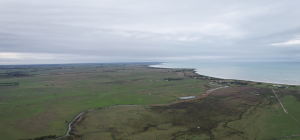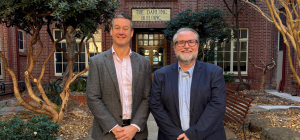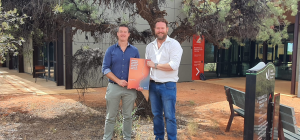With discussions regarding environmental water recovery in the Murray-Darling Basin Plan receiving attention lately, we invited Prof Barry Hart to write an article on the topic, building on his extensive experience in water research and management.
Did you know that in the Murray-Darling Basin (MDB) climate change will impact the volume of water for the environment significantly more than the volume for consumptive uses such as irrigation? That is unless we change the current policy settings or allow for these effects in the way we plan for a changing climate.
What is the situation?
The fact that environmental water is being adversely impacted by climate change has been known for over a decade. In 2009, CSIRO reported that by 2030, assuming a median climate change scenario, the available surface water volume in the Murray-Darling Basin would be reduced by 12 percent or almost 2,500 GL/year. Further, CSIRO showed that the impact on the sharing of this water between consumptive use, losses and outflows would be significant and not equal. They predicted that consumptive uses would be reduced by only 4 percent, while water to maintain river and floodplain ecosystems (environmental water = ‘losses’ and outflows) would be reduced by 12 to 24 percent.
More recently, in assessing the impact of lower inflows on state shares under the Murray–Darling Basin Agreement, the Interim Inspector-General of Murray–Darling Basin Water Resources showed that the inflows to the River Murray have fallen by around 39% since 2000 compared with the mean flow in the period 1985 to 2000. But the impact of these overall reductions in volumes is not equally distributed between water for the environment and that for irrigation and other consumptive uses; currently the environment is being hit the hardest.
These unequal impacts on environmental water are not only occurring in the Murray-Darling Basin. A recent assessment of the water resource for Southern Victoria found that surface water resources had declined in most rivers with those closer to Melbourne (e.g., Yarra, Maribyrnong, Werribee and Moorabool) declining by 15-25% over the past 15 years. Again, these overall declines were not shared equally between the environment and consumptive uses – environmental volumes declined by 4 to 28 percent compared with 1 to 13 percent for consumptive uses.
In summary, assuming similar climate change impact as used by CSIRO (2009), the below graph shows the likely changes to entitlement and non-entitlement water in the MDB by 2050 compared with the current situation, with environmental water reduced by over four times that of entitlement water.

So why is this situation occurring in the MDB?
In simple terms, water in the MDB can be divided into two categories – entitlement water and non-entitlement water – which are protected by law very differently.
Entitlement water – is able to be harvested and held in storages, with entitlement holders able to ‘call upon’ their entitlement and have the water delivered to a farm or reach of river. These entitlements can be either high and low reliability depending upon the type of entitlement, they are well protected by law and can be bought and sold on the water trading market. Until around 2009, nearly all entitlement water was used for irrigation.
Now, because the amount of water allocated for consumptive use was excessive, some of these entitlements (approximately 20 percent) have been acquired by the Commonwealth Government for the environment. This ‘held’ environmental water is protected in the same way as consumptive water entitlements and has been essential for protecting critical ecosystems during dry times.
Non-entitlement water is sometimes called ‘planned’ or ‘above cap’ water because its management is controlled through the state regional water resource plans. This environmental water is essential for filling wetlands and triggering the mass breeding events that help fish and bird populations to recover after dry times. However, it is not legally protected in the same way as water entitlements or water rights, and can be difficult to define and monitor. For these reasons, this non-entitlement environmental water is currently more at risk from climate change than entitlement water.
This is very important, since approximately 58 percent (or around 19,000 GL/year) of the total water resource in the MDB is non-entitlement or environmental water (total input volume 32,553 GL/year; average use under entitlements of around 10,890 GL/year [of which around 2,100 GL/year is held environmental water]).
To ensure there is not a disproportionate impact of climate change on environmental water, the current policy settings in the Water Act (2007) and the Murray-Darling Basin Plan (2012) need to change. The currently scheduled review of the Water Act in 2024 and the Basin Plan by 2026 is the obvious time for this to occur, but there is some urgency as this is just two to four years away.
What are some options for change?
There are a number of options for ensuring this imbalance between water for the environment and irrigators does not continue no matter what climate change brings. Some possibilities are discussed below, all of which will be highly contested.
Option 1: Keep the existing ratio of entitlement water to non-entitlement (environmental) water constant – currently consumptive water use or sustainable diversion limit (SDL) is around 27% of the total surface water resource or around 8,800 GL/year compared to the total of ca. 32,600 GL/year. The implication of this change in policy would be that both the environment and the consumptive users would suffer the same proportional reduction in water availability with climate change, or one could argue they both suffer the same ‘pain’. This could be achieved through a combination of amendments to: water resource plans; bulk entitlements; annual allocation strategies; or dam operational plans, to make them more adaptable to a variable and changing climate.
Option 2: Develop a new sustainable diversion limit (SDL) that accounts for climate change – this would involve very difficult decisions for the community to make regarding: what water-dependent environment was desired and achievable in the future (the Ecologically Sustainable Level of Take); and what type and extent of the irrigation industry was desired and achievable in the future. In essence, this would mean redoing a major component of the Basin Plan with an eye on the future (20 to 50 years hence) reduced water resources due to climate change.
Option 3: Develop a new sustainable diversion limit (SDL) that allows for the differing effects of climate change on entitlement and non-entitlement water – following key elements of the approach under Option 2 to determine the balance between environmental and economic outcomes under plausible future climates, the SDL could be set in a way that allows for the differing effects of climate change on entitlement and non-entitlement water. This approach could achieve the overall outcome sought with substantially less issues in term of impacts on property rights.
Another option proposed by the Wentworth Group is the ‘downstream flow targets’ option. These targets would equate to existing state or Basin Plan environmental water requirements (EWR) and would have to be met before lower security water entitlement holders could commence extractions.
All these options have challenges, and there may be other options available to address preferences for changing the current set of rules. But protecting the environment of the Murray–Darling Basin against climate change is an important responsibility for the Commonwealth and State governments, and it must be done hand-in-hand with the community. Working through these options will be an important part of the 4-year journey to the Basin Plan Review in 2026.
How to decide on an equitable climate ready policy?
The history of changes to the distribution of the Basin’s water resources between consumptive and environmental uses has been divisive – a ‘them and us’ situation has occurred. The decision-making processes adopted for the development of the initial 2012 Basin Plan led to considerable unrest, particularly in rural communities where it was felt that their economy was going to be severely impacted.
It is obvious that the next Basin Plan must be developed more collaboratively. Subject to meeting Water Act requirements, including the need to act on the basis of the best available science, there is potential to use deliberative decision-making processes and involve independent groups, such as Watertrust Australia, when developing the next Basin Plan.
Finding the right balance between the environmental, social, economic and cultural outcomes to be achieved in the Basin is a job that must be done collectively. All people who value the Basin must be heard, and those making the final decisions must do so transparently and be accountable for the decisions.



